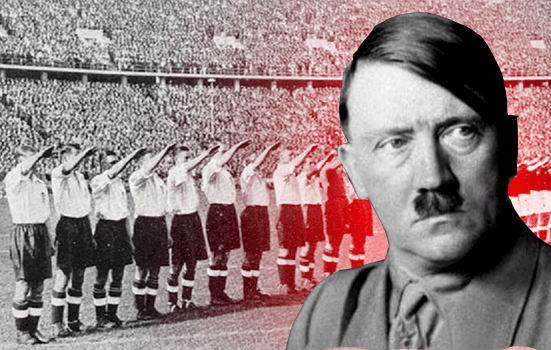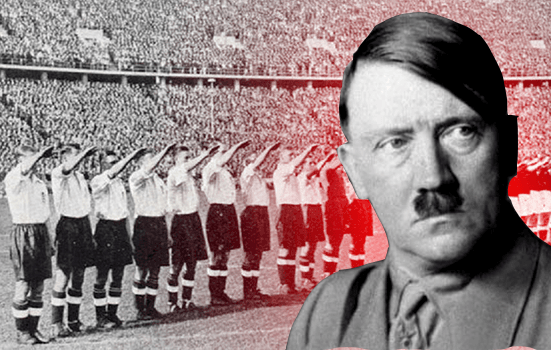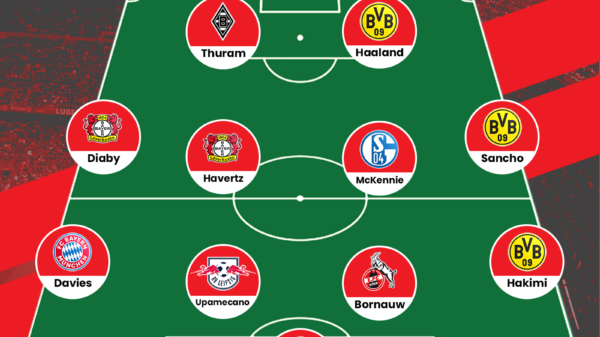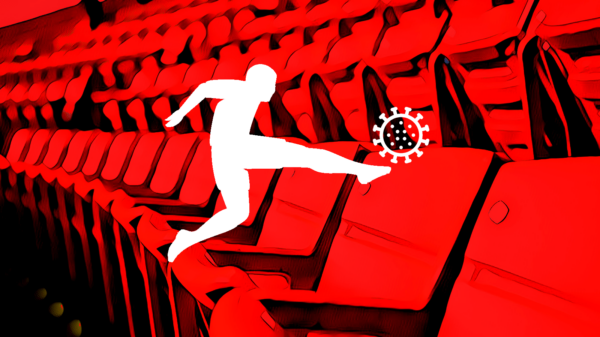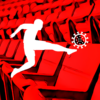‘Hitler’s manipulation of the sport was an art’
The Nazi government had exploited sport as part of the larger picture- to strengthen the “Aryan race”. Hitler asserted that the German “Aryan” race was gifted above all other races. Nazis wanted to exercise political control over the country through sports and more importantly, prepare the German youth for war. “Non-Aryans”- Jewish or part-Jewish and Gypsy athletes — were gradually and effectively excluded from German sports facilities and associations. They were allowed marginal training facilities, and their opportunities to compete were limited.
Mussolini’s use of football didn’t go unnoticed. The German dictator was the master of propaganda and wanted to use the game to his advantage. There was one problem though- the German football team of the time was certainly not one the Führer could count on to execute his master plan. It was clear to the Nazis that they couldn’t use football to their benefit the way Mussolini had. But Hitler was a conniving man. When he had a vision of something, he sought to achieve it. The world would see the German dictator use football’s popular appeal and mould it to his advantage through manipulation, coercion and corruption.
Like mentioned before, Hitler had seen the power of football. The Nazi party slowly started encouraging more Germans to play it. Their efforts didn’t go in vain as they oversaw the proliferation of clubs across the country. Before it flourished under the Reich, however, football was first broken apart and reorganised, with the worker and church-run clubs eliminated and replaced by outfits run along lines more in keeping with the Nazi movement. The Nazi party appointed Felix Linnemann as the head of the German Football board, the Deutscher Fußball-Bund (DFB). Linnemann controlled the board, from the appointment of coaches to the selection of players. The Nazi party used Linnemann to spread their political ambitions on the game.
Hitler expressed his contempt for democracy by taking out his state from the ‘League of Nations’ in 1933. He then sought to express the potential of his country through football. The ‘beautiful game’ proved to be exactly what he needed to reassure his European neighbours and guise his true intensions as he prepared his country for war.
On December 4, 1935, the German football team travelled to London to play the home team, which was regarded to be the best one in the world at the time. There were anti fascist protests, but that failed to stop the match. According to writer Ulrich Linder, the reason for the German team going to play England was to show the international community that the Germans were a civilized set of people who knew how to behave and live like the rest of the world, contrary to the belief at the time. True to their reputation, England went on to dominate the game and the score line. A brace from George Camsell and another goal from Cliff Bastin made sure England comfortably won the match 3-0.
But even in defeat Hitler got exactly what he wanted. The English press hailed the sportsmanship of the German national team and lauded its efforts. A daily at the time read ‘The Germans played English football and played it like gentlemen’. There was an offside decision against the visitors in the match, which could have been debatable. However, the fans that had come to cheer on Germany, also behaved respectably and garnered the admiration of the British press, with another paper reading ‘But not one German’s voice was raised in protest. I doubt if any League crowd would have risen to this level of mass chivalry’
MORE READING | Fascism & Football: How Italy won the 1934 & 1938 World Cup
Fascism & Football: The political history of Spanish football
The German footballers might have lost but Hitler had completely and utterly succeeded in his propaganda mission. Hitler’s press officer said ‘Germany’s political soldiers of the Führer had won’
Hitler’s intentions were not known to the world for a long time. While the international community was always dubious about the nature of his rule, the German dictator made sure that they remained in that state, never sure of his next move. Taking the cover of the 1936 Berlin Olympics, the Nazi government of the time effectively hid its anti-Semitic agenda and plans for territorial expansion. It was also effective in bedazzling the many foreign spectators and journalists with an image of an ideal country- a peaceful, tolerant and efficient Germany. It has been stated that ‘the 1936 Berlin Olympics were the most successful exploitation of a sporting event in history’. The whole world watched Germany execute one of the most impeccably planned events in sporting history.
Even though the home team won the most medals, the shine was belittled by Jesse Owens, the black American athlete, who won four gold medals. Four days hence, the football team was supposed to make up for this. However, Hitler could only watch the Die Mannschaft, suffer an embarrassing defeat at the hands of Norway, a weaker team by any standards. This was the first match Hitler saw and it ended in a 2-0 defeat by the underdogs. Obviously the Führer, who was promised that his side would win the match ‘easily’, left in a mighty huff. What made Germany’s horrible showing at the Olympics even worse was Hitler’s native country, another German speaking nation, emerge as one of the best sides of the time. Austria had narrowly lost the final to Italy and were truly scintillating on the field. But the ‘Wunderteam’ loathed German football. When the two met in 1931, Austria destroyed them with the scoreline of 6-0, 5-0. The Austrians and Germans played opposite styles of play. While the Germans were inflexible in their style, the Austrians were fluid and inventive.
Mathias Sindelar was the Viennese legend at the time. He was known for his attacking prowess in front of goal and his creative style of play. People who watched him fell in love with the sport. His fame was not confined to Austria. He was wanted by a host of clubs including Manchester United. Affectionately known as Sindi, he was voted as Austria’s greatest sportsman of the 20th century. This was after he died at the tender age of 36.
In March 1938, Germany annexed Austria in what came to be known as the ‘Anschluss’- the political union of the two nations. This offered Hitler the wonderful chance of building the football team by getting the Austrian star players to represent the Die Mannschaft, by forcibly recruiting them. Still hurt by his side’s embarrassing showing at the home Olympics, the German dictator wanted to build a team that would reinstate German superiority in the field of sport. Despite various threats from the various police wings of the Nazi regime and Hitler himself, Sindelar refused to oblige the Führer and did not agree to join the revamped German side. He made his point clear as he scored one of two goals leading to Germany’s defeat in a ‘farewell’ match to Austria immediately before the planned integration. Austrians were asked to lose the match with Sindelar, the captain of his side reportedly personally asked to do so. The Austrians refused. And to make his point further clear, he, after scoring, went in front of the VIP box (which was filled with Nazi officials) along with another teammate and danced in celebration. Not a year later, Sindelar was killed in his sleep with the help of carbon monoxide fumes. He was just 36 at the time.
There are many versions to how he died. People speculated that he committed suicide because he was unable to do what he loved with freedom- play football. The majority claimed that it was the work of the Nazis. The Gestapo file on him had him marked as pro-Jewish and a social democrat. His death, however, has been registered as an accident. This was only because his friend, Egon Ulbrich, wanted to give him a state funeral which could only be done without a criminal element being involved in it (criminal referring to both murder & suicide). This scandal showed that Hitler would meet any sort of defiance not with even tolerance but with the most ruthless of consequences.
By this time, Britain and her allies were engaged in a policy of ‘appeasement’- a diplomatic policy of making political or material concessions to an enemy power in order to avoid conflict. Football proved to be something which could be relied upon as a soother in the time where the air was volatile and always uncertain. England travelled to Berlin to play the Germans, two months after Germany had captured Austria. The Englishmen won 6-3 but German prestige got no blow. Losing to England was not shameful as every team at the time was accustomed to the superiority of the Three Lions on the football pitch. Hitler’s priority in the game was merely propaganda. Like in 1935, he wanted to show the world that Germany was not the aggressor that every one made her out to be. It has to be understood that Hitler always wanted his moves to come as a surprise to prevent pre-emptive action to be taken against his nation.
The fact that England went to play football in Germany’s capital simply reinstated the legality of Hitler’s regime. The British government was in fact asked to stop the game from happening but keeping in line with her strict policy of appeasement, it made sure the game went ahead as planned. What made the situation even worse for England was when the international community saw the images of the English football team give the Nazi salute on the pitch during the German national anthem, a gesture which the British foreign office asked the players to do. The fact that Hitler was not even present at the time made this action even more appalling and it was criticised world-wide. But the Führer succeeded in what he wanted.
The 1938 World Cup was played in France. In the opening match, the new German side comprising five Austrians in the starting 11 was drawn to play Switzerland- a team they were expected to beat. A 1-1 draw meant that the sides had to meet in a replay of the game. Germany took the lead in the match scoring two quick goals, but the longer the game went, the more apparent it became that the Germans and Austrians were not playing for the same side. Switzerland scored four goals to advance to the next stage of the tournament, and the team that Hitler had taken personal efforts to make world-class came back home before anyone had anticipated. This was another humiliation on the football field for Hitler’s Germany.
On August 9th, 1942, the Start Stadium in Kiev, present capital of Ukraine, became the site of one of football’s most infamous moments. This was when the ‘Death Match’ took place. The Second World War was in progress and the city was under Nazi occupation at the time. Flakelf, the German official Luftwaffe (aerial warfare branch of the German Wehrmacht during World War II) team, assembled with pure and perfect Aryans, insisted to replay FC Start, a side which was proving to be a very good at the time.
The first game between Flakelf and Start took place three days before the Death Match. Start won the game comfortably as the score line read 5-1. For Hitler and the Nazis, this loss was unbearable. After all, the strictly Aryanised German team was supposed to be indestructible and much superior to the Soviet locals. The loss put Hitler’s philosophy in clear danger.
The story goes that Germans, whose egos had taken a mighty toll by the defeat, asked the Kiev team for a rematch. The German team, which was supposed to be much superior in the realm of sport, was unsure of the locals and warned them beforehand to lose the match.
Before the game started, a man dressed in Schutzstaffel (SS) uniform entered Start’s locker room with a message. The SS was a ‘major paramilitary organization under Adolf Hitler and the Nazi Party’. He told them that he was the referee, asked them to adhere to do the rules and greet the opponents in ‘their fashion’. It meant that the players were asked to do the Nazi Salute- raise hand and say “Heil Hitler”. It became clear to them that the SS Officer, the referee of the game, was asking them to lose the match. The locals also were aware that decisions would not go their way. But they were not to be intimidated by this.
In response to Flakelf’s “Heil Hitler!”, FC Start, pretending to do the same, began raising their arms only to put it on their chests and yell “Fizcult Hura!” which was the Soviet sporting salute meaning “Fitness, culture, hoorah.”.
The match didn’t start well for the Kiev unit as they went to half-time trailing the Germans 3-1. Halftime again saw an SS officer coming to FC Start’s locker room and asking them to lose or beware of the consequences. This probably motivated the players who had seen their country captured by the ruthless invaders as they made a heroic comeback scoring four goals and winning the replay 5-3. But Start players knew that their actions would hold a result. Few days later, a few of the players (reported to be five or six in various accounts) were summoned to a Gestapo (official secret police of Nazi Germany and German-occupied Europe) official’s office. They were to never return. It is certain that, Nikolai Korotkykh, the Start forward, was tortured to death soon after. The rest of the players were sent to Siretz, a death camp feigned as labor camp two days after Korotkykh’s death. It was a death sentence, and ultimately resulted in the infamous term Death Match.
(This incident has been reported as a legend, because it involves propaganda of two nations- Soviet Union, who exaggerate the spirit shown by their nationals and Germany, who went to lengths to deny it. However, Makar Goncharenko, a player for FC Start spoke about the match in various accounts, one of which has been taped by the staff of the World War II museum)
Like in Italy, football was used to politicize the game for the Nazi cause. Hitler used the sizable charm of the game for his propaganda use. It is true that Germans were incompetent then and didn’t help Hitler’s cause of justifying the superiority of the Aryan race but Hitler won in his main aims as his ulterior motives almost always came through.
References:
BBC Documentary: Football and Fascism
Soccer Politics / The Politics of Football




















































